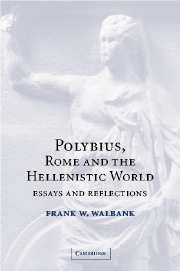Book contents
- Frontmatter
- Contents
- Preface
- Acknowledgements
- List of abbreviations
- 1 Polybian studies, c. 1975–2000
- HISTORICAL AND GEOGRAPHICAL PAPERS
- 2 The geography of Polybius
- 3 Egypt in Polybius
- 4 The surrender of the Egyptian rebels in the Nile delta (Polyb. xxii.17.1–7)
- 5 Two Hellenistic processions: a matter of self-definition
- 6 Polybius and Macedonia
- 7 Sea-power and the Antigonids
- 8 H TΩN OΛΩN EΛΠΙΣ and the Antigonids
- 9 Hellenes and Achaeans: ‘Greek nationality’ revisited
- 10 The Achaean assemblies
- POLYBIUS AS A HISTORIAN
- POLYBIUS ON ROME
- TRANSMISSION OF POLYBIUS
- Bibliography
- Indexes
8 - H TΩN OΛΩN EΛΠΙΣ and the Antigonids
Published online by Cambridge University Press: 22 September 2009
- Frontmatter
- Contents
- Preface
- Acknowledgements
- List of abbreviations
- 1 Polybian studies, c. 1975–2000
- HISTORICAL AND GEOGRAPHICAL PAPERS
- 2 The geography of Polybius
- 3 Egypt in Polybius
- 4 The surrender of the Egyptian rebels in the Nile delta (Polyb. xxii.17.1–7)
- 5 Two Hellenistic processions: a matter of self-definition
- 6 Polybius and Macedonia
- 7 Sea-power and the Antigonids
- 8 H TΩN OΛΩN EΛΠΙΣ and the Antigonids
- 9 Hellenes and Achaeans: ‘Greek nationality’ revisited
- 10 The Achaean assemblies
- POLYBIUS AS A HISTORIAN
- POLYBIUS ON ROME
- TRANSMISSION OF POLYBIUS
- Bibliography
- Indexes
Summary
In 217, Polybius (v.101–2) informs us, Philip V, who had received private information about the Roman disaster at Lake Trasimene, revealed this to Demetrius of Pharos, who thereupon encouraged him to end the war with Aetolia and plan an invasion of Italy as a first step to world conquest, ἀρχὴν τη̃ς ὑπὲρ τω̃ν ὅλων ἐπιβολη̃ς. This suggestion appealed to Philip, who was young, bold and successful and came from a house which had always been inclined more than any other to covet universal dominion, ἐξ οἰκίας ὁρμώμενον τοιαύτης ἣ μάλιστα τη̃ς τω̃ν ὃλων ἐλπίδoς ἐφίεται. At the subsequent peace conference at Naupactus the Aetolian Agelaus is said (Polyb. v.104.7) to have taken up the same theme and urged Philip to compete at the appropriate moment, σὺν καιρῷ, for world sovereignty, τη̃ς τω̃ν ὃλων δυναστείας; and from now on Philip dreamt of nothing else (Polyb. v.108.5).
Are we to believe all this? Was the oikia from which Philip sprang so aggressive and ambitious? Or has Polybius got it all wrong? He certainly believed it to be true, for in a later passage, dealing with the year 201 (xv.24.6) and probably referring to Philip's treacherous seizure of Thasos in that year (xv.24.1), he upbraids Philip for his irrational behaviour in cherishing ideas of world dominion (περιλαμβάνοντα ται̃ς ἐλπίσι τὴν οἰκουμένην), yet at the very outset of his campaign proclaiming his duplicity and so losing all credibility: for by so doing he sacrificed both honour (τὸ καλόν) and advantage (τὸ συμϕέρον).
- Type
- Chapter
- Information
- Polybius, Rome and the Hellenistic WorldEssays and Reflections, pp. 127 - 136Publisher: Cambridge University PressPrint publication year: 2002
- 1
- Cited by



